| << | Contents | >> |
Exchanged Glory II: The OK Stronghold
Chapter Three. The Battle at the OK Stronghold
I went back and forth like this for years, switching between obedience and disobedience in an attempt to feel OK. I never reached my goal and eventually nicknamed the pattern the “OK Flip-Flop.”
The OK Stronghold
The following picture describes a set of thoughts and feelings that I believe affect a great number of people. I have nicknamed them the “OK Stronghold.”
The left side shows thoughts and feelings that our internal Parent sends toward our internal Child. The right side shows responses that our Child answers back.
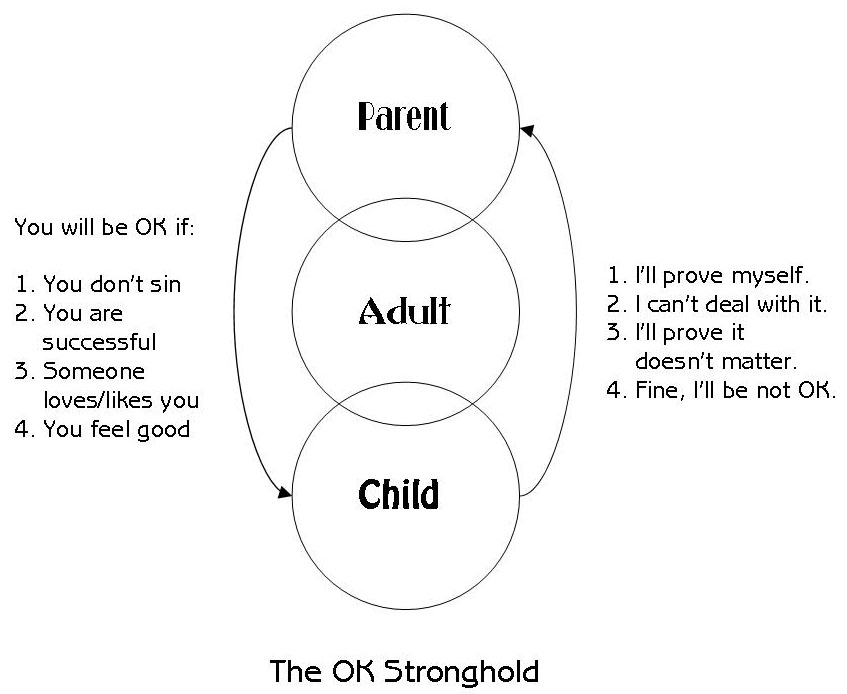
| Prev Fig | Next Fig |
The OK Flip-Flop
I will share from my experience to describe how to use this picture:
When I was a teenager struggling with sexual temptations, my internal Parent would tell me, “You will be OK if you don’t sin” (option 1 on the left side). My Child would answer, “I’ll prove myself” (option 1 on the right side). I would try to think pure thoughts and to control my actions. As long as doing so wasn’t too difficult, I felt fairly OK.
When temptations grew my internal strife grew with them, and I stopped feeling OK. My Child cried, “It’s too hard; I can’t deal with it” (option 2 on the right side). God’s requirements seemed oppressive, and since His yoke was supposed to be easy and His load light (Matthew 11:30), I felt partly justified in letting go and relieving myself sexually. As I did, the resulting sense of satisfaction and pleasure helped me to once again feel OK.
After a while I would become uneasy about my actions, and this brought “not OK” feelings. In order to get rid of them, I would switch back to, “I’ll prove myself.” I would stay away from sin, which eased my guilt and gave me some hope that I had at last found victory. This allowed me to once again feel OK.
In time, the internal pressure would build again until I would destabilize back to, “I can’t deal with it,” which relieved the pressure and helped me to make my way back towards feeling OK. Then as guilt and consequences once again grew, I would switch back to, “I’ll prove myself.”
I went back and forth like this for years, switching between obedience and disobedience in an attempt to feel OK. I never reached my goal and eventually nicknamed the pattern the “OK Flip-Flop.”
Other Parent Messages
Besides the message that I would be OK if I didn’t sin, there were at least three other types of messages my Parent might give my Child.
First, on my job, sin wasn’t really the issue, so my Parent would say, “You will be OK if you are successful” (option 2 on the left side). For example it might say, “You will be OK if you are a talented worker.” This would inspire me to be dedicated and competent.
Second, in social situations my Parent might tell my Child, “You will be OK if someone loves/likes you” (option 3 on the left side). I would try to be kind and funny to get people to notice me.
Finally, my Parent might spoil my Child with the seemingly loving message, “You will be OK if you feel good” (option 4 on the left side). In doing so, it would give me permission to do what brought me happiness, even if it was wrong. For example, it might allow me to sin sexually as long as I felt that doing so was an expression of the “true me.” After all, I reasoned, how could I be emotionally healthy if I wasn’t allowed to honestly live from my heart?
Recovering addicts especially need to recognize the lie of “You will be OK if you feel good.” Most addictions are rooted in the desire to feel “normal,” and our pursuit of that state of mind drives us to our next fix of sex, drugs, or whatever. Recovery is often only possible when we decide we are willing to feel bad for long enough to learn a better way to live.
Other Child Messages
My Child had two other responses it might give to my Parent. First, if it felt my Parent was wrong, it might say, “I’ll prove that what you want doesn’t matter. I’ll find a better way” (option 3 on the right side). In this case, it wasn’t giving up on being OK; it was redefining how it got there. For example, if my Parent said, “You will be OK if a certain father figure likes you,” my Child might answer, “I’ll prove that it doesn’t matter if that person likes me. I will get other people to like me.”
Finally my Child might say, “Fine, I’ll be not OK. It’s not worth the effort to try” (option 4 on the right side). It could reason that the demands of my Parent were too high. In an extreme case, it might persuade me to turn to drugs or sex to fight off the pressure. Pleasure would replace hope in an attempt to ease the pain of defeat.
OK Games: I’ll Prove Myself
An OK Game is a conversation between two or more people in which OK feelings are involved, usually under the surface. There are too many flavors to show all of them in this book, so I will limit myself to a few examples.
For the first seven years of my career, my management and I played a game called “I’ll prove myself.” Management would say, “You will be OK if you produce good products,”[18] and I would try to prove my ability. They would then reward me with praises, promotions, and paychecks.
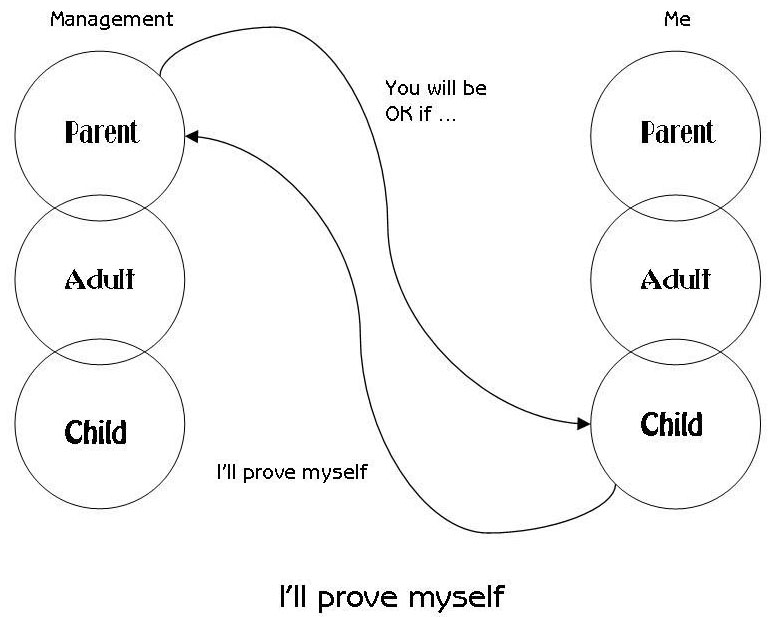
| Prev Fig | Next Fig |
While the game was working, it was so exciting and fun that I saw little reason to question it. I, of course, knew there were dangers. I might neglect my relationship with God to pursue success or material wealth, but I managed to keep my priorities in line for the most part. I was able to both win the game and enjoy God.
OK Games: Just You Wait and See
When I was forced into the new job I mentioned in Chapter One of this book, my life changed.[19] I learned to play a new game.
“Just you wait and see” was a form of the “I’ll prove it doesn’t matter” response of the OK Stronghold. It started out with the same message, “You will be OK if you produce good products,” but in this case the definition of a good product had changed from my previous job. It contradicted many of the values I had formed in my internal Parent, and I found myself in a conflict between the way I felt I should work (the “I will be OK if” line on the far right) and the way my job required (the “You will be OK if” line from Management’s Parent to my Child).
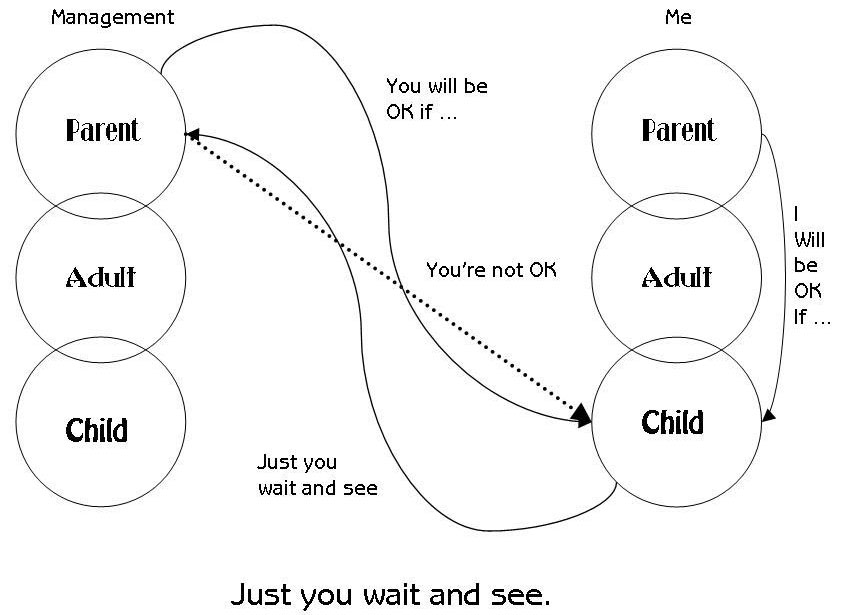
| Prev Fig | Next Fig |
I began to realize that for every “You will be OK if …” message, there was a flip side – “You are not OK if you don’t …” (represented by the dotted line in the picture above). It hurt and scared me to be on that side of the game, especially when my financial security was at stake.
I had faced “not OK” messages before. In high school, peer pressure told me that being popular and partying would make me OK. I disagreed and followed Jesus. I didn’t worry much about being “not OK” in the eyes of my peers.
Unfortunately, my job was different. I believed, based on the Bible, that I should obey my management. Politely ignoring their demands wasn’t an option.
I was surprised at how hard it was to submit to them. I had obeyed authority figures before, but once again, my job was different. My parents, teachers, and church leaders had placed demands on me, but it always seemed that my welfare was high on their list of concerns. Though I sometimes didn’t want to do what they told me, I believed that they were sincerely trying to lead me into a prosperous and happy life.
On my job, I for the first time felt like an expendable tool of an impersonal force called the “good of the company.” I was expected to make sacrifices in my own welfare so that others could make money. It scared me.
I came up with an approach that allowed me to both be true to my own feelings and to in some ways honor my management. I told them I would find a better way to get the work done. I would submit to their goals but not their methods. I said in effect, “Just you wait and see. I’ll prove that this whole organization is wrong, and I can change it for the better” (The “Just you wait and see” line from my Child to Management’s Parent).
OK Games: I’m Out of Here
Chapter One of this book described how I finally concluded that on my job, “Just you wait and see” was too big of a game to play.[20] The organization probably couldn’t be changed, and trying to force the issue might damage me. At that point, I could have played a game called “I’m out of here” (a form of the “I can’t deal with it” or the “Fine, I’ll be not OK” response in the OK Stronghold).
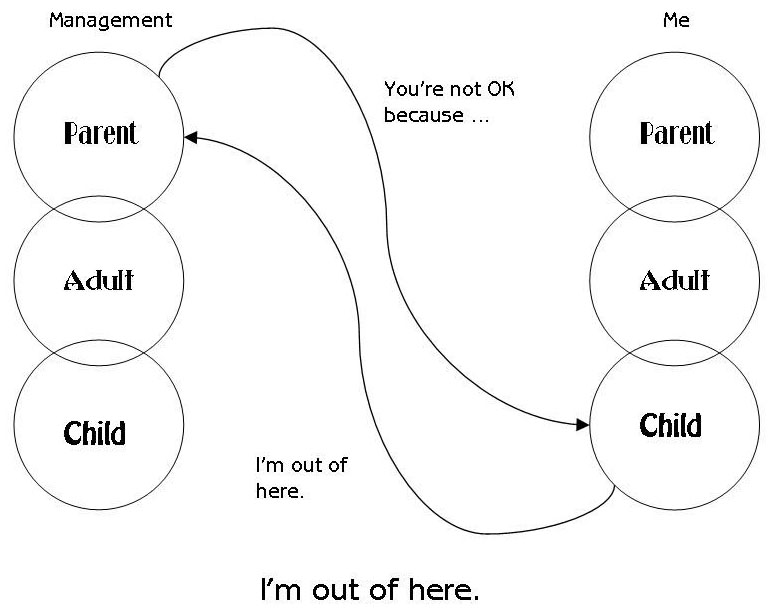
| Prev Fig | Next Fig |
A person plays “I’m out of here” when they react to pressure by running from it. If I had quit my job or stopped trying, I would have played it. Instead, I settled for an approach that had some similarities to it, but without the down side. I started to cooperate and learn on my job while I at the same time requested a transfer to a better one. This allowed me to serve others and also to take care of myself.
OK Games: No, You’re not OK
One final example of an OK Game is very common. It is called “No, you’re not OK.”
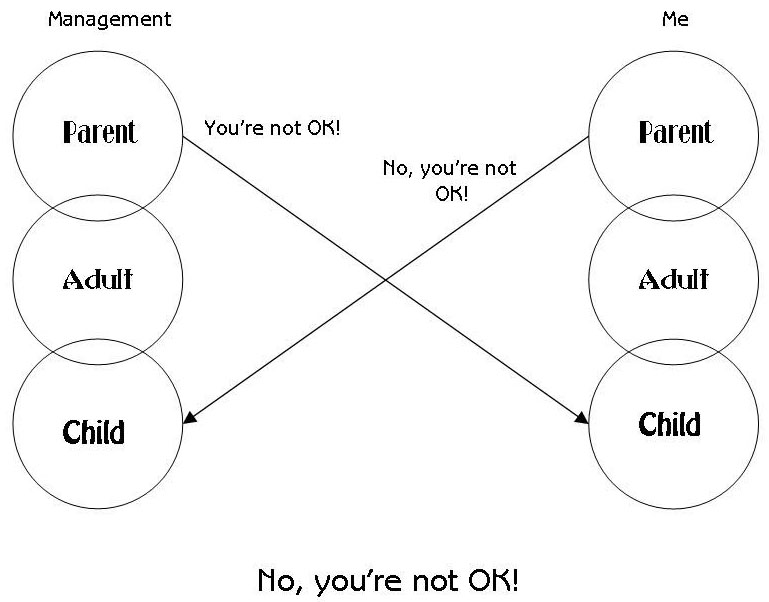
| Prev Fig | Next Fig |
In this case, our Parent tries to protect our Child by attacking the other person’s Child. I resorted to this when I made my comment about people being so concerned with covering their rears that they had gotten their heads stuck in them. I was easing the pain of my own “not OK” feelings by shifting the blame to those who were telling me what I needed to do.
It was a bad way to handle the situation. My managers weren’t being evil toward me, but even if they were, I should have acted out of love.
Summing up: Be agreeable, be sympathetic, be loving, be compassionate, be humble. That goes for all of you, no exceptions. No retaliation. No sharp-tongued sarcasm. Instead, bless — that's your job, to bless. You'll be a blessing and also get a blessing. (emphasis added)
(1 Peter 3:8-9, The Message)
Like most OK Games, “No, you’re not OK” is an expression of fear of people rather than trust in the Lord. We turn against those who threaten us rather than believing that God will work all things for good (Romans 8:28-29).
The fear of human opinion disables; trusting in GOD protects you from that.
(Proverbs 29:25, The Message)
Search Comments
This page has been visited 0010 times.
| << | Contents | >> |
10 per page